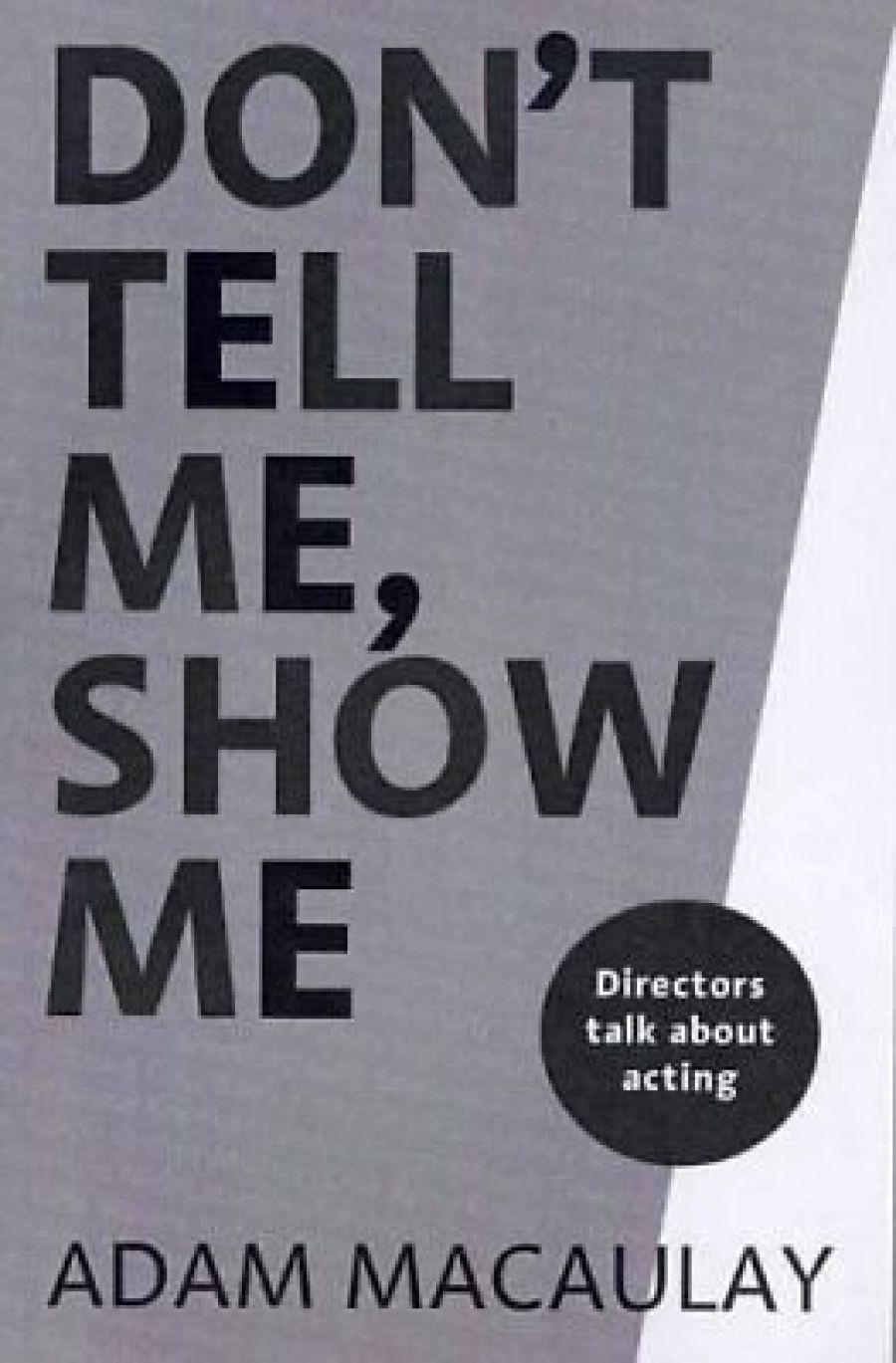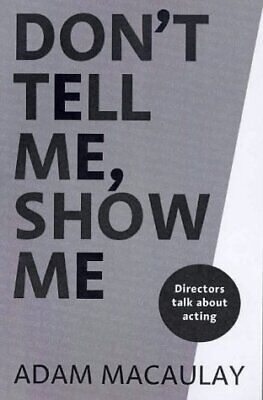
- Free Article: No
- Contents Category: Film
- Review Article: Yes
- Article Title: In on the Act
- Online Only: No
- Custom Highlight Text:
In the movie The Producers (now a musical), Gene Wilder accuses Zero Mostel of treating actors like animals. ‘Have you ever seen an actor eat?’ is Mostel’s pithy reply. There is a truth buried in this joke: eating can be important to actors in a profession where much time can be spent between jobs, ‘resting’, as it is euphemistically called.
- Book 1 Title: Don’t Tell Me, Show Me
- Book 1 Subtitle: Directors talk about acting
- Book 1 Biblio: Currency Press, $29.95 pb, 223 pp
- Book 1 Cover Small (400 x 600):

- Book 1 Cover (800 x 1200):

So what are directors looking for in an actor? Quite a lot, actually. Not surprisingly, they want actors who are responsive to direction, in the sense that they are open, vulnerable even, and prepared to take risks; as Di Drew puts it, an actor who offers her choices rather than a predetermined interpretation. The kind of skills training provided by the drama schools is a definite advantage. Directors also prefer actors with wider cultural interests and intellectual curiosity. ‘Go and see things – exhibitions, concerts,’ Barry Kosky tells them, ‘and be inspired by great work outside your normal experience.’ And if you have ambitions to do Shakespeare, take note of John Bell’s advice to read your Bible and Ovid first.
All the directors see rehearsal as a collaborative project (well, one can’t help thinking, they would have to, wouldn’t they), though film and television necessarily impose more restraints. But, more importantly, they stress the interactive nature of theatre, actors needing to work off each other. There is a particular frustration with the actor who is impossible to work with in rehearsal and then produces an extraordinary performance on the night, because this ignores the needs of the other members of the cast. Similarly, Ros Horin expresses her dislike for certain (unnamed) Sydney actors ‘who are much celebrated and well thought of’ but who ‘suck energy in rather than give it out’, making themselves ‘watchable’ at the expense of the dynamics of the scene.
There is some unnecessary agonising about characterisation, particularly the hoary old conundrum about the extent to which the actor can ‘be’ the character. In fact, most of Macaulay’s directors don’t want long preparatory discussion of characterisation. Kosky crankily declares that ‘through an appalling, watered-down, messed-up, fucked-up sort of Stanislavsky-via-the-Studio-in-New-York thing, the entire world has become obsessed with psychological profiling, which is all chitchat’. Hackles are raised when an actor says ‘My character wouldn’t do that’, because the ‘character’ should emerge from the action of the play. Michael Gow is the most uncompromising:
There is really no such thing as ‘character’. It is simply the sum of all the actions that are in the script and that the character does. If you ask me ‘What’s my character?’ or ‘What’s my character like?’ I’ll say ‘Well, let’s rehearse it and see.’
Interestingly, amidst all the talk of collaboration and exploration, many directors pine, albeit with a hint of apology, for actors with a high level of technique. Aubrey Mellor regrets that it is unfashionable these days to ask actors to learn their lines by some prescribed point in rehearsal. Drew complains of the poor diction of many younger actors – ‘I simply can’t understand what they say!’ – and many of us will sympathise with her. Bruce Beresford reminds us that actors need to be able to do accents. Technique, Gale Edwards feels the need to insist, is not a dirty word.
And what do directors really think of Australian actors? Kosky, safely ensconced as co-artistic director of the Schauspielhaus Theatre in Vienna, blithely announces that he is not interested in working with most Australian actors, seeing the profession here as marked by ‘a sort of inbred laziness or neglect’. Phillips, on the other hand, presiding over the currently prosperous Melbourne Theatre Company, sees ‘many brilliant actors around Australia’.
There is, ultimately, a kind of mystery about what happens when an actor ‘acts’. Kosky laments that the traditions of the West have lost sight of ‘the sacred nature of acting’. Certainly, acting calls for dedication and commitment in a profession in which financial rewards are usually modest. Is it any wonder, then, as Edwards remarks, that actors can be ‘fragile’?
Macaulay has assembled a cast of notable directors in theatre, film and television. Inevitably, there is repetition and some ‘thinking aloud’ rambling. It is clear that Macaulay has heavily edited the original interviews, which one trusts will be lodged in an appropriate archive. It is, nevertheless, the directors who are doing the talking: Macaulay should therefore be identified as the editor, and not as the author, of the book.


Comments powered by CComment